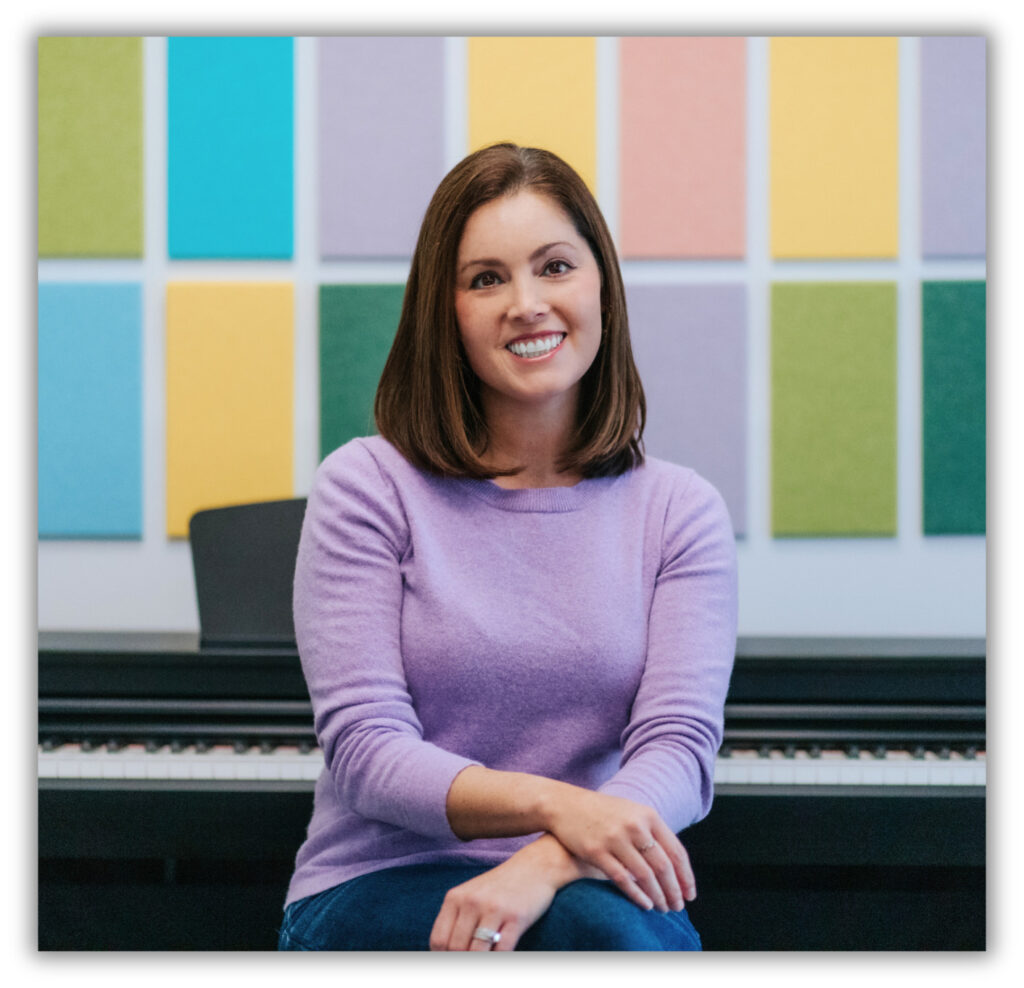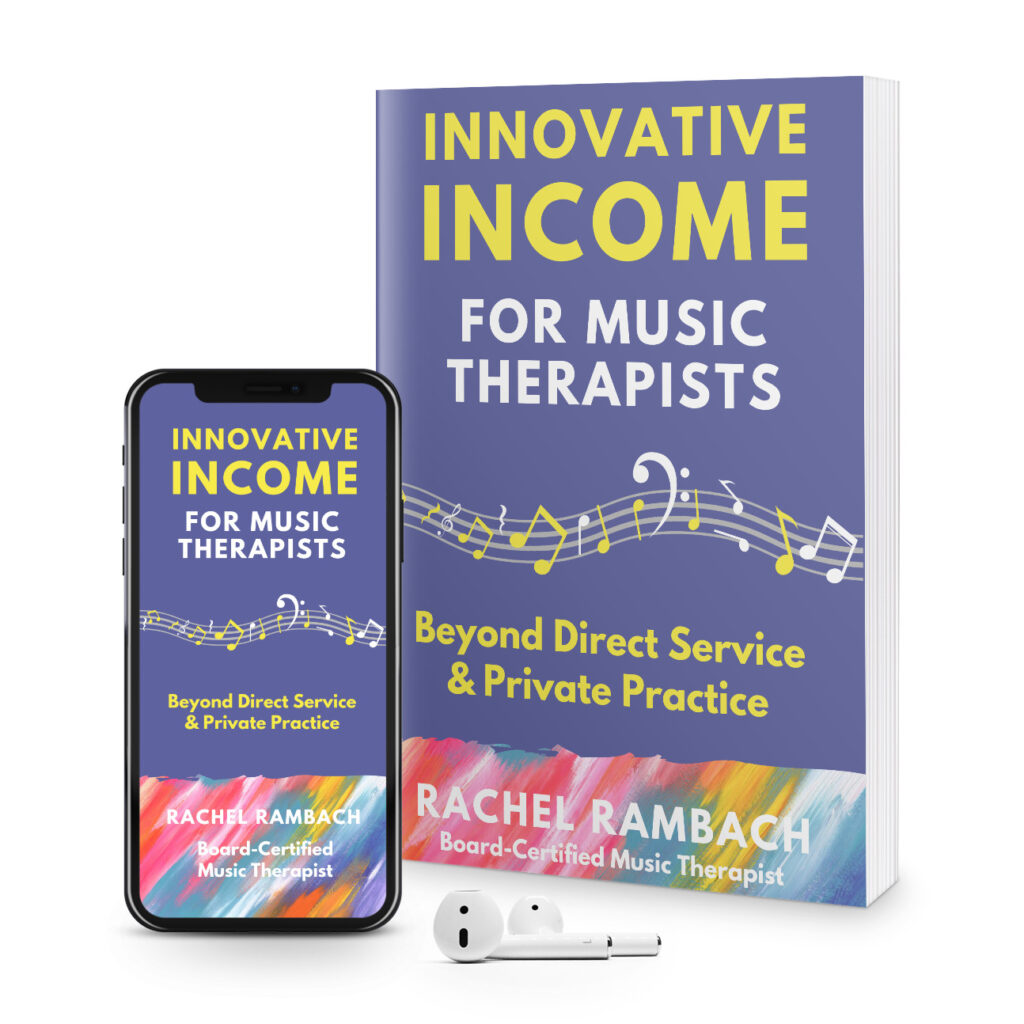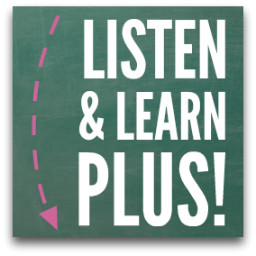by Rachel | Professional Development
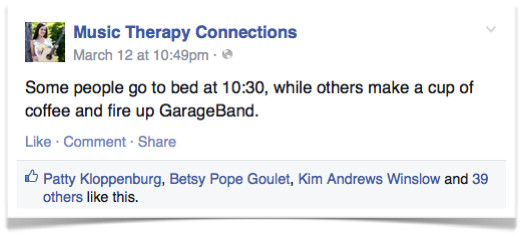
For almost my entire adult life, I have been an early riser. My alarm went off at 5 am every weekday morning, and then I’d go to the gym, come home, and spend the next couple of hours writing, working on songs, or other creative projects. Those morning hours were when my brain worked best.
After I went back to work following my maternity leave, I tried getting back into that routine. Some days, it worked; other days, Parker would wake up expecting an early breakfast just minutes before my alarm went off. Sometimes he would sleep in, sometimes he wouldn’t. To this day, he still has no consistent morning wake-up time. And neither do I, since he is still waking up multiple times throughout the night.
Needless to say, my productive early mornings are a thing of the past. And since I spend my days with Parker before work in the afternoons, I don’t have much time for creative projects (heck, I barely get a chance to check my email!) during daylight hours.
After I finish seeing students (usually between 7-8 pm), Zach and I give Parker a bath, put him to bed, and then eat dinner. By 9 pm, I’m ready to tackle blog posts, songs, music therapy interventions, and business-related work.
On a given night, I usually go to bed between 12:30-1:30 am, which to my former self would sound crazy! I never thought I would be a night owl, but then again, I never knew how much becoming a mom would affect every aspect of my life. I’ve actually grown to like the quiet hours when everyone else is asleep, and I’m getting used to sleeping in (usually 7 am at the latest, ha!).
At some point I would love to get back to my productive early morning routine, but I’m not counting on that happening any time soon. Until then I’ll just enjoy my new normal — and the late-night Facebook chats with fellow working moms who are up doing the same thing as me ;)
by Rachel | Professional Development
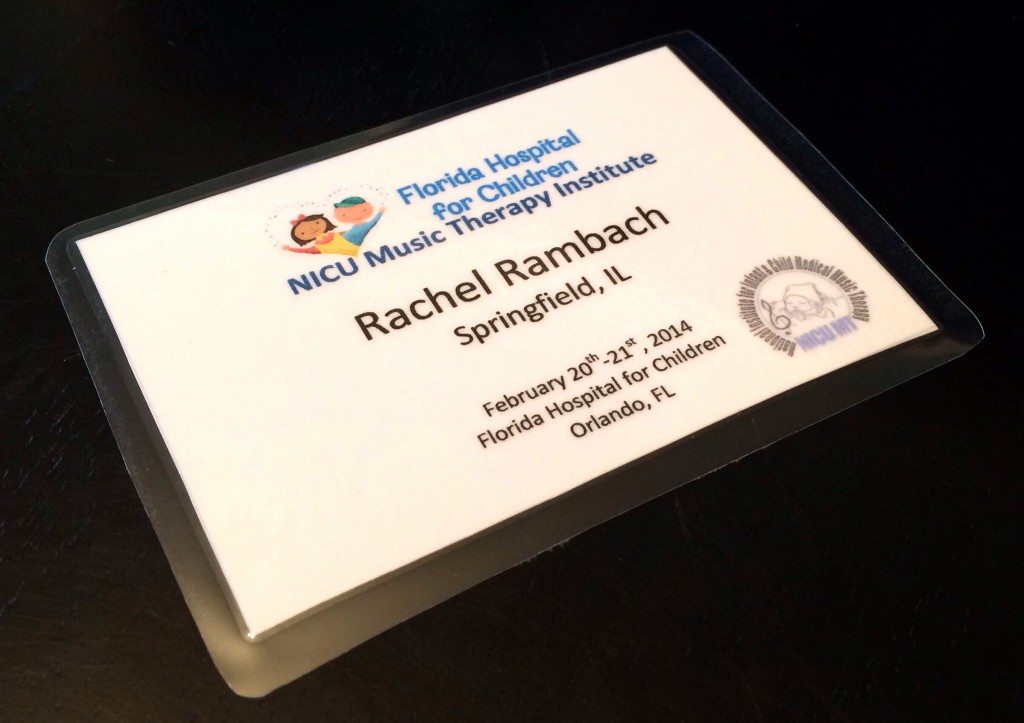
In all my years of studying and practicing music therapy, I never had any interest in medical music therapy. The idea of working in a hospital seemed pretty intimidating, and just not for me. Of course, that’s what I said about working with kids — originally I had my heart set on seniors with dementia — and look at me now.
But over the summer during my maternity leave, I started thinking about going through training for music therapy in the NICU (neonatal intensive care unit). I’m not sure if it was the postpartum hormones or what, but the desire stuck with me and I registered for the lecture training at AMTA national conference in November.
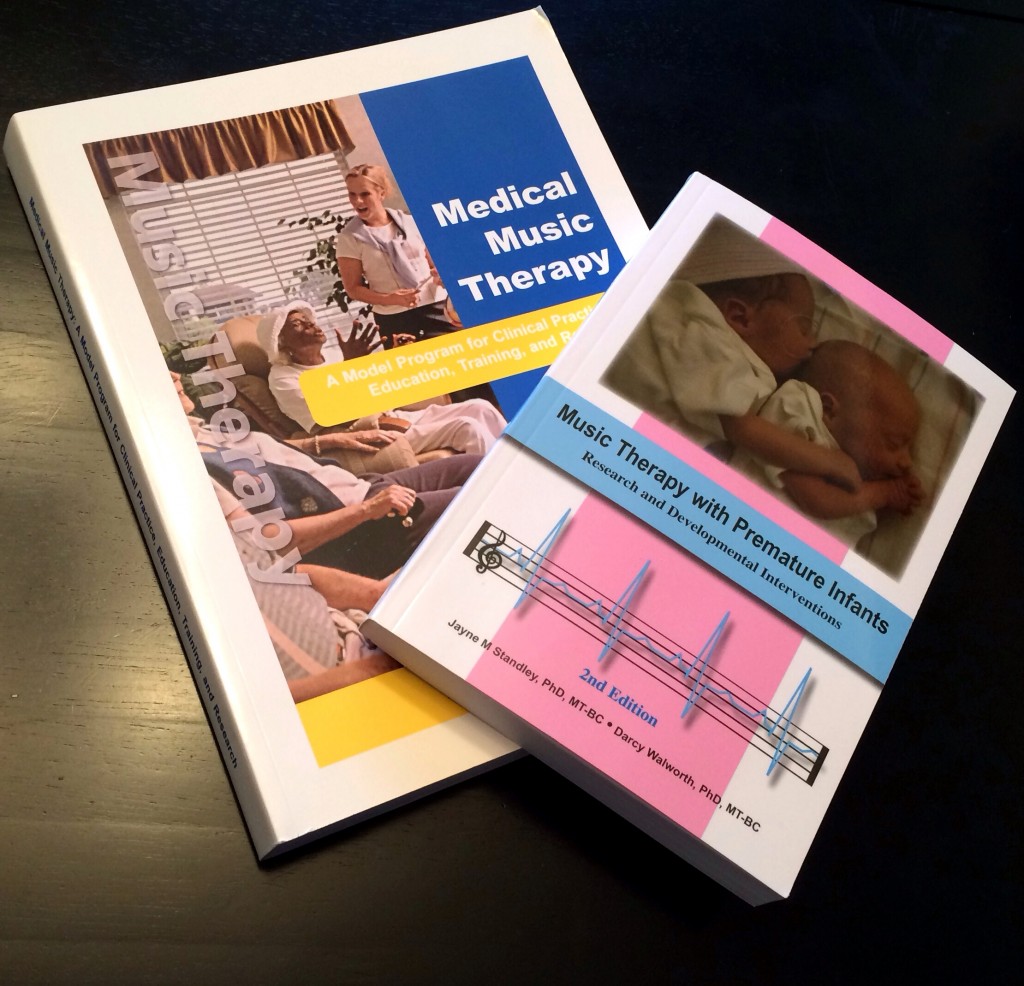
After spending my first day of conference attending the NICU lecture training, I knew I had made a good decision. The research, techniques, and outcomes were all fascinating, and I couldn’t wait to get some hands-on experience during the clinical fieldwork training component.
This part was a big investment, both financially and time-wise. I had to get caught up on immunizations and have some bloodwork done in order just to register, and then complete quite a bit of paperwork as well as pay a fee. Once I was approved to attend the training, I booked my plane tickets to Orlando and reserved a hotel room across the street from Florida Hospital. The hardest part was waiting until February!
I happily escaped the arctic Midwest (with my baby and his favorite babysitter, aka my mom, in tow) this past week, though the only sun I soaked up was on the walks to and from the hospital.
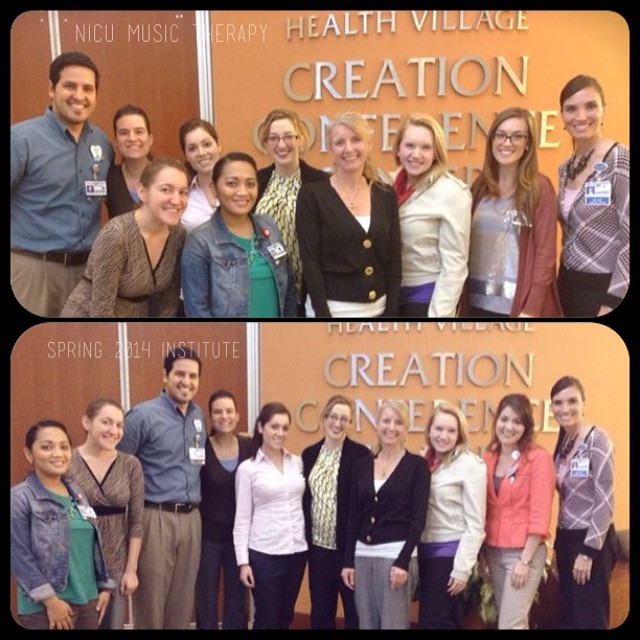
The training was facilitated by music therapists Brianna Negrete, from Florida State University, and Rich Abante Moats, from Florida Hospital. Antonio Milland, Amy Robertson, Dr. Jayne Standley, and Ellyn Hamm also provided training and tons of valuable information. The two full days consisted of classroom training as well as quite a bit of time in the NICU both observing and working with premature infants.
On the first day, we learned the procedure for multimodal stimulation (MMS), which helps babies tolerate and process different kinds of stimulation through singing, touch, rocking, and encouraging eye contact. Being in the NICU was definitely intimidating at first, but by the second day, I felt much more comfortable there. I had the opportunity to do MMS with two different babies, which was definitely the highlight of the entire experience.
On the second day, we learned more about the PAL (pacifier-activated lullaby) device and got to see it in action. We also learned about relating to staff/parents/family, medical music therapy program proposals, reimbursement, procedural support, and became more familiar with all the research behind medical music therapy.
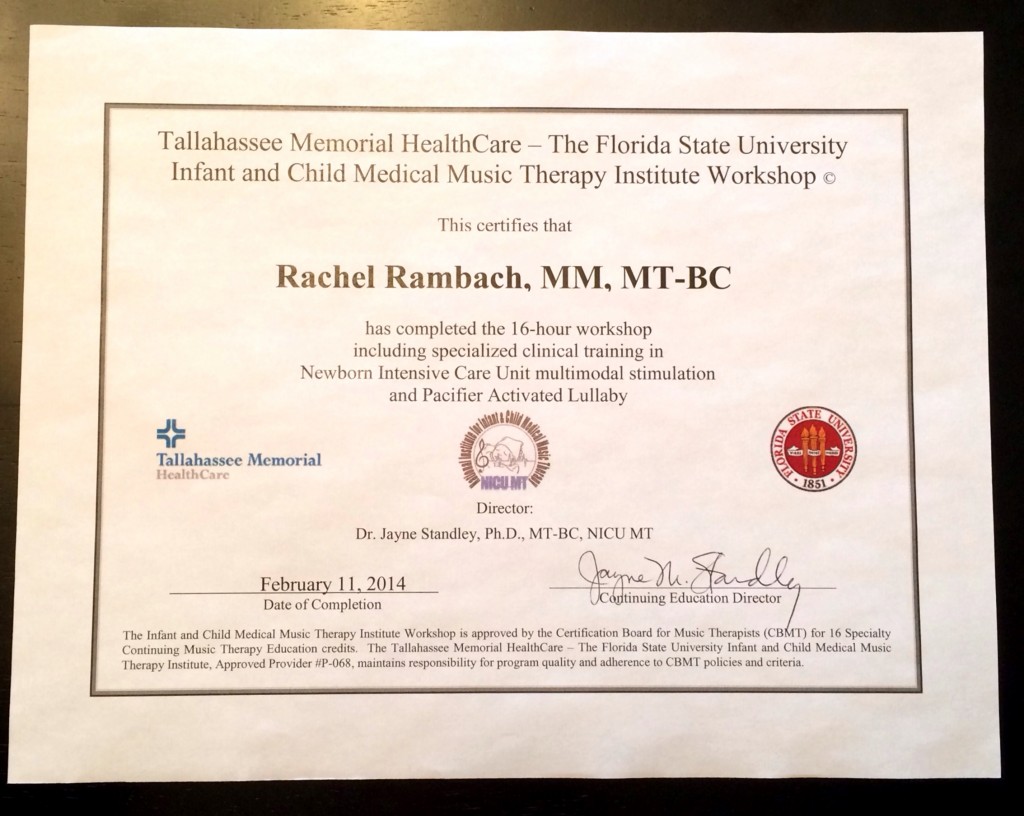
It was an intense two days of learning and experiential training, but I honestly could have stayed for a week! There was so much to learn, and every single one of the trainers was so helpful in making sure we fully understood everything and guiding us through the music therapy techniques.
I would love to have the opportunity to work in the NICU eventually. It’s a different world from what I’ve been doing for the last 7 years since becoming board-certified, but it will be a wonderful challenge professionally, not to mention very rewarding.
by Rachel | Professional Development
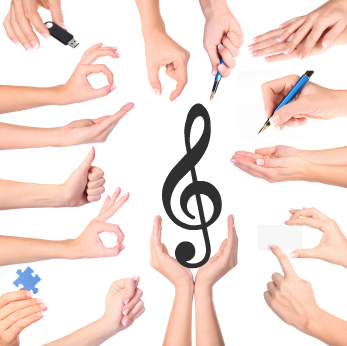
I’m excited to be participating in the 4th annual Music Therapy Social Media Advocacy Month! Check out the posts I’ve shared in years past (2011, 2012, 2013) and then below, you’ll find a special guest post by Judy Simpson.
When I started my career as a music therapist in 1983, it was not uncommon for me to describe my profession by comparing it to other professions which were more well-known. If people gave me a puzzled look after I proudly stated, “I use music to change behaviors,” I would add, “Music therapy is like physical therapy and occupational therapy, but we use music as the tool to help our patients.” Over the years as I gained more knowledge and experience, I obviously made changes and improvements to my response when asked, “What is music therapy?” My enhanced explanations took into consideration not only the audience but also growth of the profession and progress made in a variety of research and clinical practice areas.
The best revisions to my description of music therapy, however, have grown out of government relations and advocacy work. The need to clearly define the profession for state legislators and state agency officials as part of the AMTA and CBMT State Recognition Operational Plan has forced a serious review of the language we use to describe music therapy. The process of seeking legislative and regulatory recognition of the profession and national credential provides an exceptional opportunity to finally be specific about who we are and what we do as music therapists.
For far too long we have tried to fit music therapy into a pre-existing description of professions that address similar treatment needs. What we need to do is provide a clear, distinct, and very specific narrative of music therapy so that all stakeholders and decision-makers “get it.” Included below are a few initial examples that support our efforts in defining music therapy separate from our peers that work in other healthcare and education professions.
- Music therapists’ qualifications are unique due to the requirements to be a professionally trained musician in addition to training and clinical experience in practical applications of biology, anatomy, psychology, and the social and behavioral sciences.
- Music therapists actively create, apply, and manipulate various music elements through live, improvised, adapted, individualized, or recorded music to address physical, emotional, cognitive, and social needs of individuals of all ages.
- Music therapists structure the use of both instrumental and vocal music strategies to facilitate change and to assist clients achieve functional outcomes related to health and education needs.
- In contrast, when OTs, Audiologists, and SLPs report using music as a part of treatment, it involves specific, isolated techniques within a pre-determined protocol, using one pre-arranged aspect of music to address specific and limited issues. This differs from music therapists’ qualifications to provide interventions that utilize all music elements in real-time to address issues across multiple developmental domains concurrently.
As we “celebrate” 2014’s Social Media Advocacy Month, I invite you to join us in the acknowledgement of music therapy as a unique profession. Focused on the ultimate goal of improved state recognition with increased awareness of benefits and increased access to services, we have an exciting adventure ahead of us. Please join us on this advocacy journey as we proudly declare, “We are Music Therapists!”
About the Author: Judy Simpson is the Director of Government Relations for the American Music Therapy Association. She can be reached at simpson@musictherapy.org.
by Rachel | Professional Development

Over winter break, I had the opportunity to spend almost an entire Saturday writing and recording music. It was AWESOME. It reminded me of my life before baby, when my weekends were almost exclusively dedicated to musical projects. And while life is a million times better with this guy in it, I do miss having songwriting as a creative outlet on a regular basis.
We jetted off to Florida a few days after that, and spending some time on the beach soaking up the sun was just what I needed to recharge my batteries and clear my head. I thought a lot about my work and priorities while I was there, and came to the realization that my lack of creative output is what has me feeling unaccomplished these last few months.
I returned home to a FROZEN TUNDRA and also an email from a high school friend who had ordered a custom CD from me. She and her husband are expecting a baby girl in a few months, and she chose songs that she could play and sing to her. My friend had so many nice things to say about my music and how she was looking forward to sharing it with her little bundle, and that only intensified my desire to reclaim my “songwriting mojo” for lack of a better term.
Now that my baby is getting a little older, he spends more time playing independently (with close supervision, of course) while I jot down lyrics and record rough takes on my iPhone. It doesn’t hurt that Parker loves my guitar, so practicing new songs also doubles as entertainment for him :)
This is not a New Year’s resolution post, but rather a reminder to myself to choose songwriting over laundry, dishes and dusting when I have the chance. I’m usually so energized after finishing a new tune that I’m ready to tackle all those mundane chores — that songwriting mojo is quite powerful!
Are you looking to reclaim or discover your own songwriting mojo? A good place to start is my CMTE course, The DIY Guide to Writing, Recording & Sharing Your Music. Listening to my friends’ and colleagues’ creations serves as additional inspiration and motivation to keep cultivating my passion.
by Rachel | Professional Development
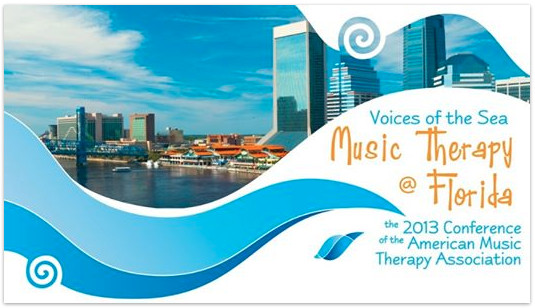
I’m not sure how it happened, but somehow November arrived and that means it’s almost conference time. It will be my 5th year attending the American Music Therapy Association’s national conference, which is in Jacksonville, FL this time around.
I’ll be arriving on Monday night, because on Tuesday I’m attending the NICU-MT institute; can I tell you how excited I am about that? I already have my trip to Orlando booked for February, when I’ll be attending the clinical fieldwork training componment of the NICU certification at Florida Hospital.
The rest of my schedule while at conference is jam-packed as usual, between serving on the technology committee, being an exhibitor at the Music Therapy Pro booth, presenting on a panel, and — this is a first — finding time to hang out with my family.
I had always planned on bringing my baby to conference, and since I’m going a couple days early, my mom and husband are tag-teaming on Parker duty while I’m busy doing conference things. My mom will fly there with us on Monday and leave on Wednesday morning, and then Zach will arrive on Wednesday evening and fly home with us on Saturday. Gone are the days of easy-breezy solo traveling, but I’m looking at this as an adventure!
At last year’s conference, I was several weeks pregnant (but not far enough along to make it public knowledge) and feeling pretty queasy. While this year brings new challenges (like finding time to nurse and pump), I’m pretty sure it will be much more enjoyable.
I can’t wait to see all my music therapy friends in Jacksonville…will YOU be there?
by Rachel | Professional Development

Every February, many of my students participate in the Illinois Federation of Music Clubs’ Junior Festival. This will be my fourth year as a member of the federation, and it’s no less nerve-racking than it was when I first started!
At the end of October, I help my students choose their two pieces (one required, one choice) that they will learn, memorize and then perform at Festival. It’s a long few months, and by the end of January, we’re all ready for the big day so that we can move on to some new repertoire.
But all their hard work pays off in the end: last year, two of my students received their first gold cups, meaning they received a “superior” score three years in a row. This year, I have 5 students hoping to receive their first gold cups.
I like participating in Festival for many reasons, both for my benefit and the benefit of my students. Here are just a few of them:
- It makes me a better teacher. My job is to help those kiddos get ready to perform not only for an audience, but for judges who will score their playing. No room for slacking!
- My students are held accountable for their practicing. If they don’t do the work, they don’t get that superior score. It’s funny how motivation levels skyrocket between October and February :)
- It’s an opportunity to learn from other teachers and students. I really enjoy being amongst a group of teachers, all of whom have different teaching styles, and my students can learn from the other participants.
- Performing in Festival builds self-confidence. There’s nothing better than the smile on a student’s face after he or she has played well and received a great score.
It’s going to be a busy weekend for all of us, as they perform both on Saturday and Sunday while I’m busy serving as a room chairman (of two rooms, this year!). I have a feeling we’ll all be much more relaxed come Monday…but until then, wish us all luck!










